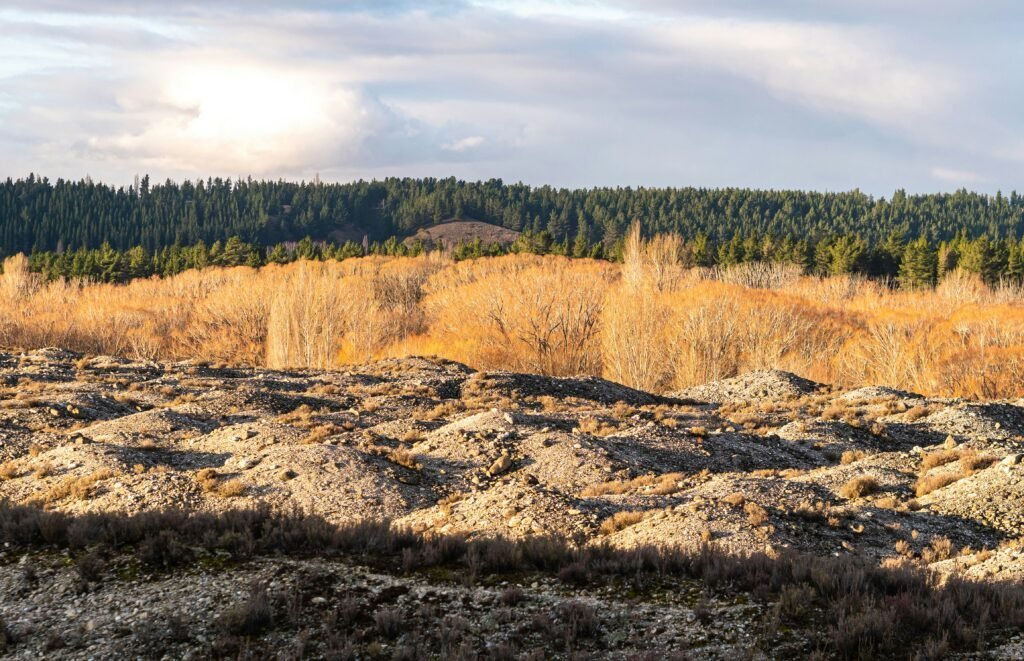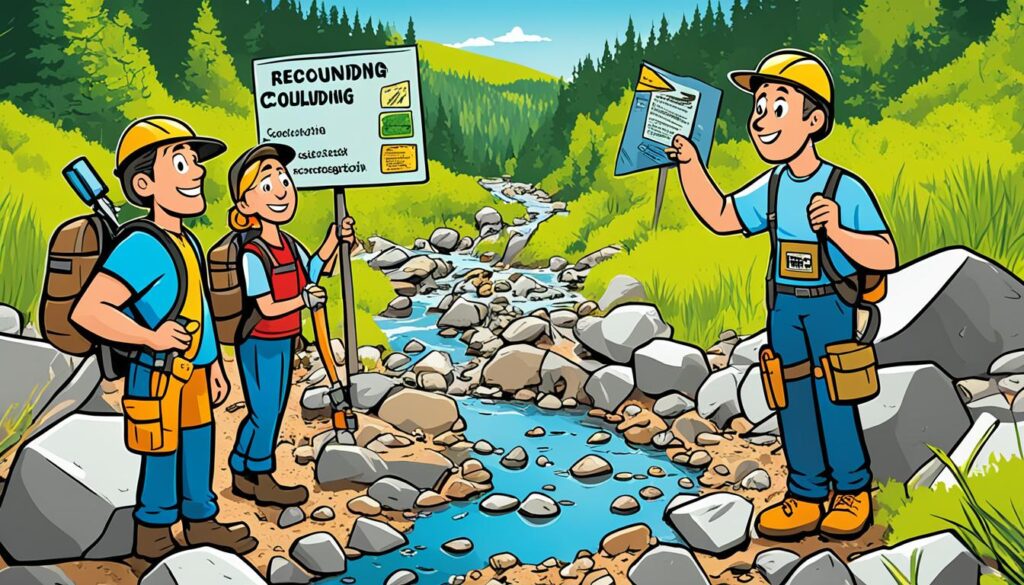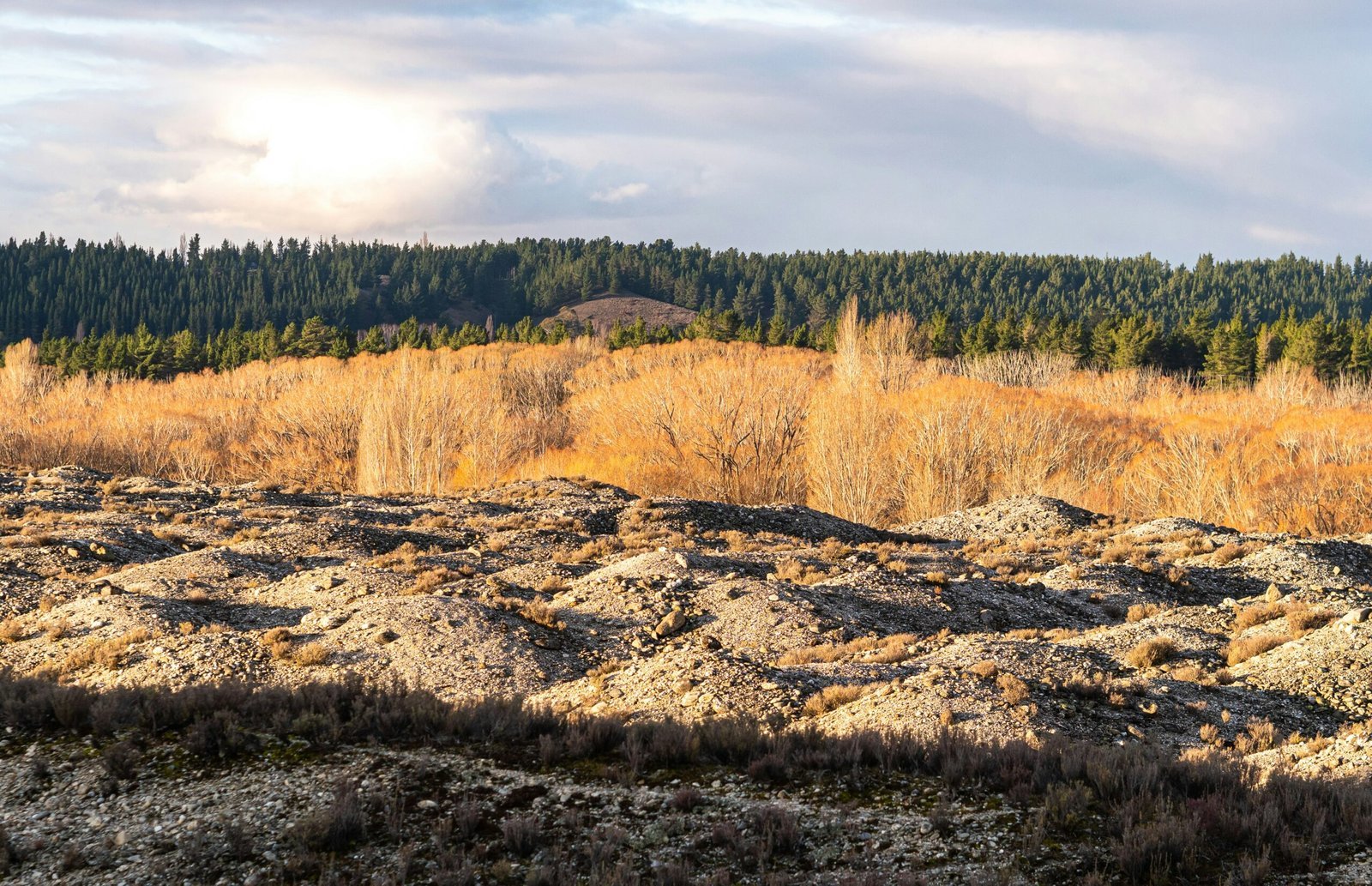
Disclosure: This Post Contains Affiliate Links; We earn a commission on purchases.
Welcome to our comprehensive guide on the legal requirements and permits necessary for gold prospectors.
Whether you’re an experienced prospector or a beginner looking to try your luck, it’s important to familiarize yourself with the legal framework and regulatory obligations that govern this exciting activity.
By understanding and complying with the legal guidelines, you can enjoy gold prospecting while ensuring the protection of both the environment and your own interests.
Key Takeaways:
- Gold prospectors need to comply with legal requirements and obtain the necessary permits for their activities.
- Legal compliance ensures the protection of park resources and the continuation of gold prospecting for future generations.
- Permits are required for various activities, including scientific research and collecting, recreational collecting, and commercial filming.
- Special use permits are needed for non-federal mineral development and commercial tours in national parks.
- Operators of mining claims and oil/gas operations must adhere to National Park Service regulations and obtain the appropriate permits.
Required Permits for Gold Prospecting Activities
Gold prospectors need to obtain specific permits for various activities related to their gold prospecting. Whether engaging in scientific research, educational collecting, recreational collecting, or commercial tours and filming, acquiring the appropriate permits is essential to comply with legal requirements and ensure the protection of natural resources.
Scientific Research and Collecting Permits
Gold prospectors who wish to conduct scientific research and collecting related to gold prospecting activities must obtain a permit through the designated channels. The National Park Service website provides the necessary information and application process to apply for these permits.
Educational Collecting Permits
For gold prospecting activities that involve educational collecting, a permit must be obtained to ensure compliance with regulations and promote responsible collecting practices. These permits enable gold prospectors to engage in educational activities while safeguarding the environment.
Recreational Collecting Permits
In certain areas, limited recreational gold panning may be permitted for gold prospectors. However, it is crucial to obtain the necessary permits to ensure compliance with relevant regulations and protect park resources. One such area where recreational collecting is allowed is the Whiskeytown unit of the Whiskeytown-Shasta-Trinity National Recreation Area in California.
Special Use Permits
Special use permits are required for gold prospectors engaging in activities such as commercial tours and commercial filming. These permits ensure that the activities are conducted in a manner that protects both park resources and the public interest. To obtain a special use permit, prospective gold prospectors must go through an evaluation process carried out by the National Park Service.
Mining Claims, Oil, and Gas Operations Permits
Gold prospectors planning to operate mining claims or engage in oil and gas operations in national parks must comply with relevant regulations. This includes submitting a detailed plan of operations and obtaining the necessary permits. By adhering to these requirements, gold prospectors contribute to the sustainable management of park resources.
By obtaining the required permits for gold prospecting activities, gold prospectors not only ensure their legal compliance but also play a crucial role in preserving the environment for future generations. Whether engaging in scientific research, educational collecting, recreational collecting, or commercial activities, obtaining the necessary permits allows gold prospectors to pursue their passion while upholding the integrity of national parks.
Scientific Research and Collecting Permits
Geologic research plays a crucial role in advancing the understanding of geology and protecting park resources. For gold prospectors who engage in scientific research and collecting, obtaining the necessary permits is essential. These permits grant them the authorization to conduct their studies responsibly within national parks.
To apply for a scientific research and collecting permit, gold prospectors should follow the appropriate procedures outlined by the National Park Service. One way to initiate the application process is by visiting the official National Park Service website. There, prospectors will find detailed instructions, requirements, and forms to complete their permit application.
Benefits of Scientific Research and Collecting Permits
Obtaining a scientific research and collecting permit offers multiple advantages for gold prospectors:
- Access to designated research areas
- Opportunity to contribute to geologic knowledge and understanding
- Ability to explore and study minerals, rocks, and geological formations
- Ensured compliance with legal and regulatory guidelines
- Permission to collect limited samples for study and analysis
By adhering to the regulations and obtaining the necessary permits, gold prospectors can conduct their scientific research and collecting activities in a responsible and sustainable manner. This not only contributes to the scientific community but also ensures the long-term preservation of park resources.
“Scientific research permits provide an invaluable opportunity for gold prospectors to contribute to geologic knowledge and improve our understanding of the earth’s composition.”
Next, we’ll explore another type of permit required for gold prospecting: recreational collecting and rockhounding permits.
| Benefits of Scientific Research and Collecting Permits |
|---|
| Access to designated research areas |
| Opportunity to contribute to geologic knowledge and understanding |
| Ability to explore and study minerals, rocks, and geological formations |
| Ensured compliance with legal and regulatory guidelines |
| Permission to collect limited samples for study and analysis |
Recreational Collecting and Rockhounding Permits
While national parks generally prohibit collecting rocks, minerals, and paleontological specimens for recreational or educational purposes, there are exceptions in certain areas. One such exception is the Whiskeytown unit of the Whiskeytown-Shasta-Trinity National Recreation Area in California, where limited recreational gold panning is allowed.
Recreational collecting and rockhounding can be fascinating hobbies, providing opportunities to explore the natural world and discover unique geological treasures. However, it’s essential to respect the rules and regulations in place to preserve the integrity of national parks.
“Recreational collecting and rockhounding can be fascinating hobbies, providing opportunities to explore the natural world and discover unique geological treasures.”
Obtaining the necessary permits for recreational collecting and rockhounding ensures that these activities are conducted responsibly, with minimal impact on the environment and park resources. These permits may specify certain areas where collecting is allowed, as well as any size or quantity limits to protect the natural balance.
If you’re interested in exploring the world of recreational collecting and rockhounding, be sure to check the specific regulations and guidelines for the national park or recreation area you plan to visit. The National Park Service website is an excellent resource for obtaining information about permits and permitted collecting areas.
Recreational Collecting and Rockhounding Permits Guidelines
When applying for recreational collecting and rockhounding permits, keep the following guidelines in mind:
- Research and familiarize yourself with the rules and regulations governing recreational collecting in the specific park or recreation area.
- Ensure you have the necessary permits before engaging in any collecting activities.
- Follow the guidelines provided by park authorities regarding permit conditions, collecting locations, size/quantity limitations, and ethical considerations.
- Respect nature and leave no trace. Minimize your impact on the environment by practicing responsible collecting techniques and avoiding damage to plants, animals, or geological features.
- Always check for updates and changes to the permit requirements and restrictions, as regulations may evolve over time.
By adhering to permit guidelines and practicing responsible collecting, you can enjoy the thrill of this recreational activity while contributing to the preservation of our natural heritage.

Special Use Permits
Special use permits play a significant role in ensuring that various activities in parks are conducted responsibly and in the best interest of park resources and the public. These permits are required for a wide range of activities, including non-federal mineral development and commercial tours. By obtaining a special use permit, individuals and organizations can engage in these activities while adhering to specific guidelines and regulations set by the National Park Service.
Special use permits are designed to strike a balance between allowing certain activities and preserving the natural beauty and integrity of our national parks. Each proposed activity is carefully evaluated by the National Park Service to determine if it meets the criteria for a special use permit. This evaluation process ensures that activities are undertaken in a manner that protects park resources and respects the public’s interest in enjoying these spaces.
Whether it’s non-federal mineral development or conducting commercial tours, the special use permit is a valuable tool to promote sustainable and responsible practices. By obtaining the necessary permits, individuals and organizations contribute to the long-term preservation of our national parks while still being able to enjoy and benefit from these unique natural landscapes.
Benefits of Special Use Permits:
- Protection of park resources: Special use permits ensure that activities are conducted in a way that minimizes harm to the environment and wildlife, safeguarding the unique natural and cultural resources of the parks.
- Preservation of visitor experience: By regulating and controlling activities through special use permits, the National Park Service aims to maintain a high-quality visitor experience, allowing visitors to appreciate the parks’ natural beauty without disruption.
- Sustainable practices: Special use permits promote sustainable practices by setting guidelines and regulations that minimize ecological impacts and preserve the delicate balance of park ecosystems.
- Public safety: The evaluation process for special use permits includes assessing potential risks and ensuring that activities are conducted safely, protecting both the participants and other park visitors.
Obtaining a special use permit for activities such as non-federal mineral development or conducting commercial tours demonstrates a commitment to responsible and sustainable practices. By complying with the regulations and guidelines set forth by the National Park Service, individuals and organizations can contribute to the long-term protection and enjoyment of our national parks.
Commercial Filming Permits
When it comes to capturing the beauty of national parks on camera, filmmakers and photographers need to secure a special use permit for commercial filming. This permit ensures that all filming activities are conducted in compliance with park regulations and guidelines. In addition to obtaining the permit, filmmakers and photographers are also required to provide a certificate of liability insurance.
It is important to note that some areas within national parks may be closed to filming during peak visitation periods to minimize the impact on park visitors and preserve the natural experience. However, there are still plenty of breathtaking locations and unique landscapes available for commercial filming projects.
If you are planning a commercial filming venture in a national park, here are some key points to keep in mind:
- Apply for a special use permit through the designated channels to ensure legal compliance
- Obtain a certificate of liability insurance to protect yourself and others involved in the filming project
- Familiarize yourself with park regulations and guidelines to avoid any violations
- Respect any closures or restrictions on commercial filming in certain areas during peak visitation periods
- Consider hiring a location scout familiar with the park to find the most suitable and visually stunning filming spots
Commercial filming in national parks offers a unique opportunity to showcase the natural wonders of these protected areas. By obtaining the necessary permits and adhering to park regulations, filmmakers and photographers can capture stunning visuals while contributing to the conservation and preservation of these national treasures.
Key Points for Commercial Filming Permits
| Points | Details |
|---|---|
| Permit Application | Apply for a special use permit through designated channels |
| Insurance Requirement | Provide a certificate of liability insurance |
| Regulations and Guidelines | Familiarize yourself with park regulations and guidelines |
| Closures and Restrictions | Respect any closures or restrictions on commercial filming in certain areas during peak visitation periods |
| Location Scouting | Consider hiring a location scout familiar with the park to find the most suitable and visually stunning filming spots |
Mining Claims and Oil/Gas Operations Permits
When it comes to operating mining claims or engaging in oil and gas operations in national parks, compliance with regulations is of utmost importance. The National Park Service has established guidelines to safeguard park resources while allowing for responsible extraction activities.
For those interested in mining claims, prospective operators must adhere to specific requirements. This includes submitting a detailed plan of operations outlining the proposed mining activities and environmental protection measures. Additionally, operators are required to post a bond to ensure financial responsibility for reclamation efforts and the restoration of affected areas.
Similarly, operators involved in oil and gas operations within national parks must obtain the necessary permits and comply with regulations. These permits are designed to minimize environmental impact and protect the natural beauty of the park.
“Adhering to the stringent regulations surrounding mining claims and oil/gas operations permits is crucial for protecting park resources and maintaining the integrity of our national parks.” – Sarah Thompson, Environmental Compliance Specialist
Conclusion
Understanding the legal requirements for gold prospecting is essential for gold prospectors to ensure compliance with the law and protect the precious park resources. Gold prospectors must obtain the necessary permits for their activities, including scientific research and collecting, recreational collecting, and commercial filming. By following the regulations and obtaining the required permits, gold prospectors can continue to enjoy their activities while preserving the environment for future generations.
Legal requirements play a critical role in maintaining the balance between gold prospecting activities and the preservation of national parks. By obtaining permits, gold prospectors demonstrate their commitment to responsible and sustainable practices. The legal framework provides guidelines and regulations that help protect the natural ecosystems and cultural heritage within these parks.
Permits not only ensure compliance but also facilitate proper management and monitoring of gold prospecting activities. They allow park authorities to track and assess the impact of these activities on the environment and make informed decisions to safeguard the natural resources. In addition, permits help minimize conflicts between different user groups and preserve the overall experience for all visitors.
Source Links
- https://www.nps.gov/subjects/geology/permits.htm
- https://asleman.org/2022/06/24/california-gold-panning-laws-regulations-and-restrictions-explained/
- https://wdfw.wa.gov/licenses/environmental/hpa/types/prospecting

Meet Ryan Conlon, the passionate owner and driving force behind Pan for Treasure.
With an unwavering love for the art of gold panning, Ryan has transformed his enthusiasm into a thriving community hub for fellow treasure seekers. [email protected]
A seasoned gold panning enthusiast, Ryan’s journey began with a simple pan and a dream, evolving into a deep appreciation for the history, geology, and thrill of uncovering precious metals.
Subscribe to Our Newsletter

